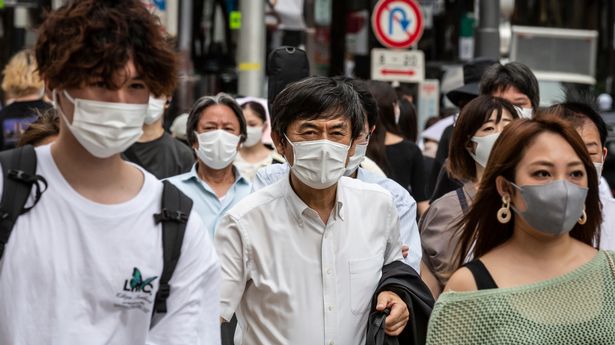The Japanese public expressed widespread reservations about going ahead with the international games as infections rise due to mutant variants – and the country is now seeing record numbers, though officials deny there is a link

Image: Getty Images)
Japan has seen a ‘frightening’ surge in Covid infections just one week into the Tokyo Olympics, after officials decided to go ahead despite widespread public concern.
States of emergency will be expanded to three prefectures near Olympic host Tokyo and the western prefecture of Osaka, as cases spike in the capital and around the country, overshadowing the Summer Games.
Tokyo, already under its fourth state of emergency since the pandemic began, announced 3,300 new daily cases, after a record 3,865 on Thursday.
And Tokyo Olympics organisers reported 21 new Games-related infections on Saturday.
Although no athletes made up the latest cases, the latest daily coronavirus infections have brought the total Games-linked number since July 1 to 241.
(
Image:
Sergei Bobylev/TASS)
Prime Minister Yoshihide Suga told a news conference the virus is spreading at an unprecedented speed largely because of Delta variant, adding he is worried the country’s hospital beds could become stretched.
“With a heavy heart, I want to ask everyone: until we see the impact of more vaccinations, I want you all to stay vigilant and implement infection prevention measures to the full,” he said, calling on people to watch the Olympics on TV at home.
Already, 64% of Tokyo’s hospital beds available for serious COVID-19 cases are filled as of mid-week.
The new emergency measures will be in effect from August 2 until August 31, while existing states of emergency for Tokyo and southern Okinawa island will be extended to the end of the month, covering 37% of the country’s population.
(
Image:
REUTERS)
Health Minister Norihisa Tamura said the country had entered a new “extremely frightening” stage as cases are spiking even though the movement of people was not increasing.
“I think that people cannot see ahead and, worrying how long this situation will last, they find it unbearable that they cannot return to normal daily life,” he told the panel.
Japan has imposed a series of “state of emergency” declarations, but the orders are mostly voluntary, unlike other countries which impose strict lockdowns.
Yet many people have grown weary of stay-home requests, with some bars refusing to adhere to service restrictions.
(
Image:
Getty Images)
Suga and Olympics organisers have denied there is any link between the July 23 to August 8 Summer Games and the recent sharp spike in cases.
Unlike the voluntary restrictions and low vaccination rates elsewhere in Japan, the Olympic village in Tokyo for athletes and coaches boasts more than 80% vaccination, testing is compulsory and movement is stringently curtailed.
Athletes and other attendees from around the world must follow strict rules to prevent any spread of the virus within the “Olympic bubble” or to the wider city. Spectators are banned from most venues.
But experts worry holding the Games has sent a confusing message to the public about the need to limit activities when less than 30% of residents of Japan are fully vaccinated.


